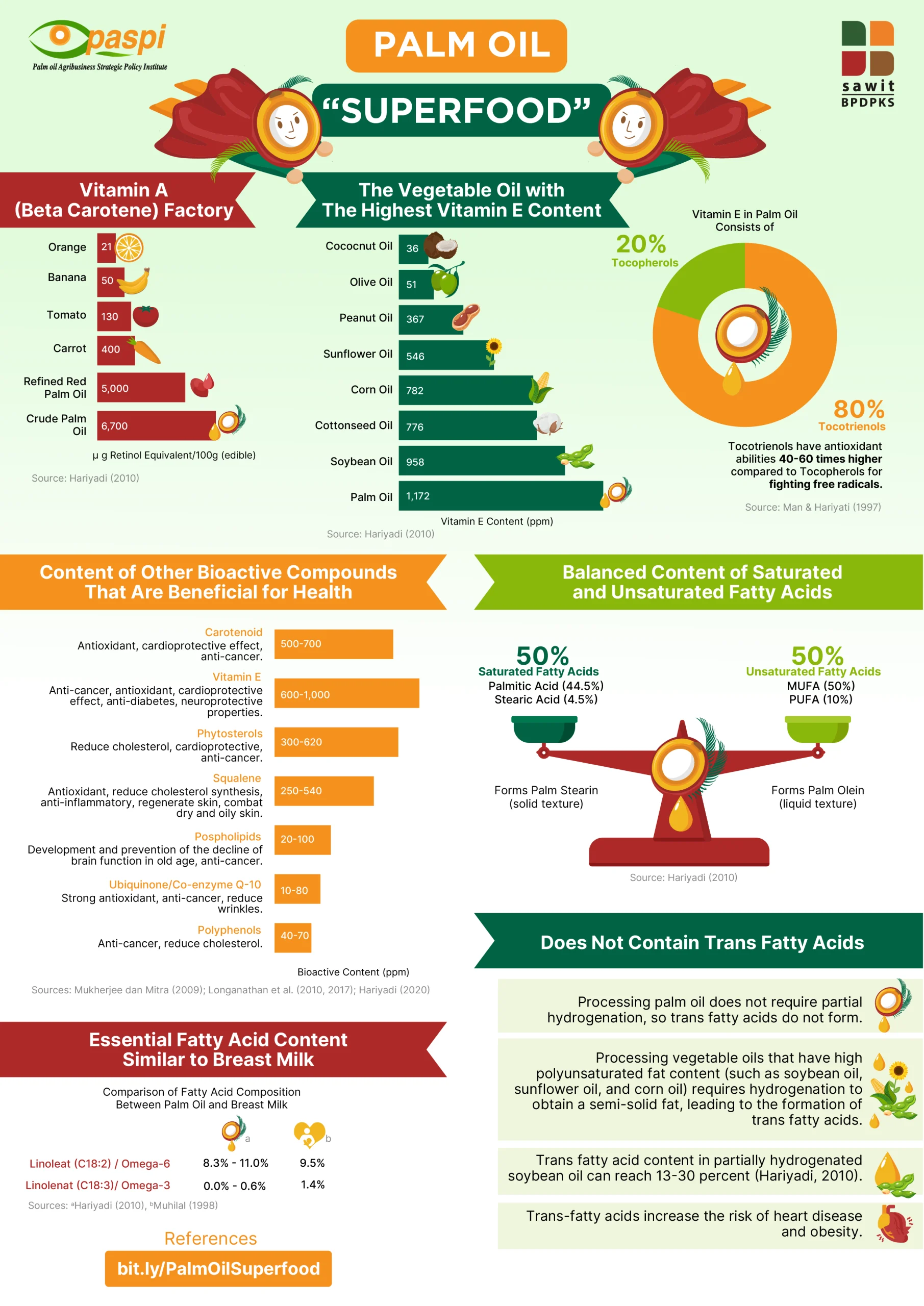
Palm oil can be classified as a Superfood. This statement is supported by studies conducted by global nutritionists, who have identified palm oil as “the world’s richest natural plant” due to its abundance of essential vitamins and fatty acids needed by the human body.
Palm Oil: The Best Source of Vitamin A
Various empirical studies (Nagendran et al., 2000; Mayamol et al., 2007; Mukherjee and Mitra, 2009; Dauqan et al., 2011) also reveal that palm oil is “the world’s richest natural source of carotenoids.” The beta-carotene in palm oil acts as an antioxidant, a precursor, and a vital source of vitamin A. The high carotene content in palm oil is reflected in its reddish-orange color. In fact, compared to food sources like oranges, bananas, tomatoes, and carrots, palm oil contains much higher levels of carotene.
A Powerful Antioxidant to Fight Free Radicals
Palm oil is also the richest vegetable oil in vitamin E, surpassing soybean, corn, sunflower, olive, and coconut oils. Palm oil’s vitamin E content consists of 20 percent tocopherols and 80 percent tocotrienols. The high concentration of tocotrienols gives palm oil extremely powerful antioxidant properties to fight free radicals.
The Health Benefits of Palm Oil’s Bioactive Compounds
In addition to vitamins A and E, palm oil contains other bioactive compounds that are beneficial for health, such as phytosterols, squalene, phospholipids, and ubiquinone. These bioactive compounds are consumed when using palm oil, offering consumers additional health benefits at no extra cost.
Essential Fatty Acids in Palm Oil for Growth and Health
Palm oil also contains essential fatty acids, including linoleic acid (C18:2) or omega-6 and linolenic acid (C18:3) or omega-3. These fatty acids are important for nutrient absorption, cell formation, immune system function, and fetal development, particularly for the brain and eyes. The fatty acid content in palm oil is similar to the fatty acids found in breast milk (ASI).
Palm Oil’s Balanced Fatty Acid Composition
Palm oil has a balanced composition of saturated and unsaturated fats, making it the healthiest vegetable oil for cooking. Compared to other vegetable oils, such as coconut, soybean, corn, and sunflower oils, which have an unbalanced fatty acid composition, palm oil offers a healthier choice.
Palm Oil is Free from Harmful Trans Fats
Another advantage of palm oil is that it does not require partial hydrogenation, a process that can lead to the formation of trans fats. Other vegetable oils, such as soybean and corn oils, often undergo this process to achieve a semi-solid texture, which can lead to the presence of harmful trans fats.
Palm Oil: A Healthy Choice for Everyday Diets
Trans fats can increase the risk of heart disease and obesity. Therefore, many global health organizations recommend minimizing trans fat intake. Palm oil and palm-based products are free from trans fats, making them a healthier option compared to hydrogenated vegetable oils.
Palm Oil as a Natural, Healthy Superfood
With all these advantages, palm oil deserves to be classified as a superfood that offers remarkable benefits for human health. Rich in vitamins, antioxidants, and a balanced fatty acid profile, palm oil is an ideal healthy alternative for everyday diets.
